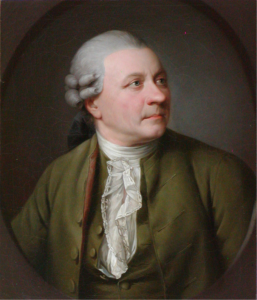To her
(Poet's title: An Sie)
Set by Schubert:
D 288
[September 14, 1815]
Zeit, Verkündigerin der besten Freuden,
Nahe selige Zeit, dich in der Ferne
Auszuforschen, vergoss ich
Trübender Tränen zu viel.
Und doch kommst du! O dich, ja Engel senden,
Engel senden dich mir, die Menschen waren,
Gleich mir liebten, nun lieben
Wie ein Unsterblicher liebt.
Auf den Flügeln der Ruh, in Morgenlüften,
Hell vom Taue des Tags, der höher lächelt,
Mit dem ewigen Frühling
Kommst du den Himmel herab.
Denn sie fühlet sich ganz und gießt Entzückung
In dem Herzen empor, die volle Seele,
Wenn sie, dass sie geliebt wird,
Trunken von Liebe, sich´s denkt!
Time, proclaimer of the best joys,
Approach, blessed time. Far away
I have been looking for you; I have shed
Too many gloomy tears.
And yet you are coming! Oh, yes, angels are sending you,
Angels are sending you to me, those who used to be humans,
Who used to love just like me, they now love
Like an immortal loves.
On the wings of peace, in the morning breezes,
Bright with the day’s dew smiling more brightly,
With the eternal spring,
You are coming down from heaven.
For she feels that she is complete and delight is being poured
Into her heart from above, her full soul,
When she, because she is loved,
Believes that she is drunk with love!
All translations into English that appear on this website, unless otherwise stated, are by Malcolm Wren. You are free to use them on condition that you acknowledge Malcolm Wren as the translator and schubertsong.uk as the source. Unless otherwise stated, the comments and essays that appear after the texts and translations are by Malcolm Wren and are © Copyright.
☙
Themes and images in this text:
Angels Dew Emptiness and fullness Eternity Hearts Heaven, the sky Joy Morning and morning songs Near and far Pouring, scattering and strewing Soul Spring (season) Tears and crying Time Wind Wings
‘She’ seems to be both Time herself (‘die Zeit’) and Meta Müller (1728 – 1758), Klopstock’s ‘Cidli’ in other Odes, whom he eventually married (in June 1754). The poem suggests that having to wait for her made time stand still for him. We are all used to the subjective experience of time appearing to go by at different rates depending on various factors (how busy we are, how old we are, how patient or impatient we are etc.), but it is still surprising to read someone welcoming the passage of time so enthusiastically.
Is it really the case that time announces the arrival of ‘the best joys’, as if our greatest delight is in anticipation and expectation rather than in reality and the recollection of happiness? How many of us, like this speaker, have driven ourselves to tears in a faraway search for a contentment that is still to come? Can we really believe that the flowering of spring that seems to be arriving is going to be ‘eternal’ or that the ecstasy of love that is promised might be ‘immortal’ and sent to us by ‘angels’?
Yes, the language seems to be inflated (not to say confused in places), but it catches something of the enthusiasm and total lack of cynicism (some might say ‘sense of reality’) that comes along with love and youth. It is the writer as much as the approaching beloved that appears to be ‘drunk with love’.

☙
Original Spelling An Sie Zeit, Verkündigerin der besten Freuden, Nahe selige Zeit, dich in der Ferne Auszuforschen, vergoß ich Trübender Thränen zu viel! Und doch kommst du! O dich, ja Engel senden, Engel senden dich mir, die Menschen waren, Gleich mir liebten, nun lieben Wie ein Unsterblicher liebt. Auf den Flügeln der Ruh´, in Morgenlüften, Hell vom Thaue des Tags, der höher lächelt, Mit dem ewigen Frühling, Kommst du den Himmel herab. Denn sie fühlet sich ganz, und gießt Entzückung In dem Herzen empor die volle Seele, Wenn sie, daß sie geliebt wird, Trunken von Liebe, sichs denkt!
Confirmed by Peter Rastl with Klopstocks Oden. Erster Band. Leipzig bey Georg Joachim Göschen. 1798, pages 124-125; and with Oden von Klopstock. WIEN, gedruckt bey Joh. Thomas Edlen von Trattnern, k.k. Hofdruckern und Buchhändlern. 1784, pages 155-156.
Note: The title is An Cidli in the 1784 edition, and An Sie in the 1798 and subsequent editions.
To see an early edition of the text, go to page 124 [142 von 356] here: http://digital.onb.ac.at/OnbViewer/viewer.faces?doc=ABO_%2BZ223304809


